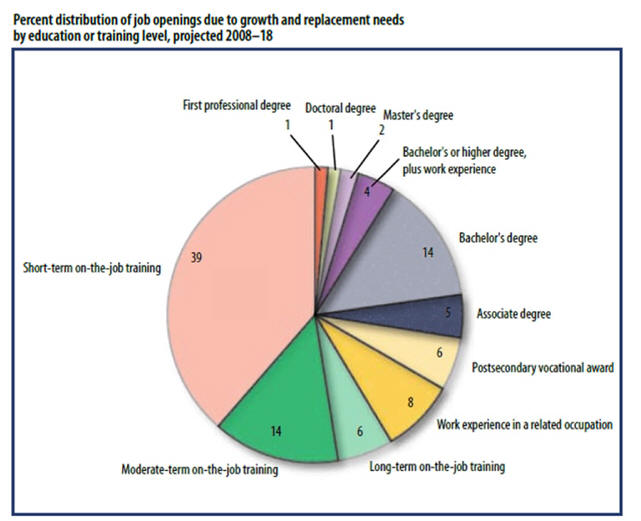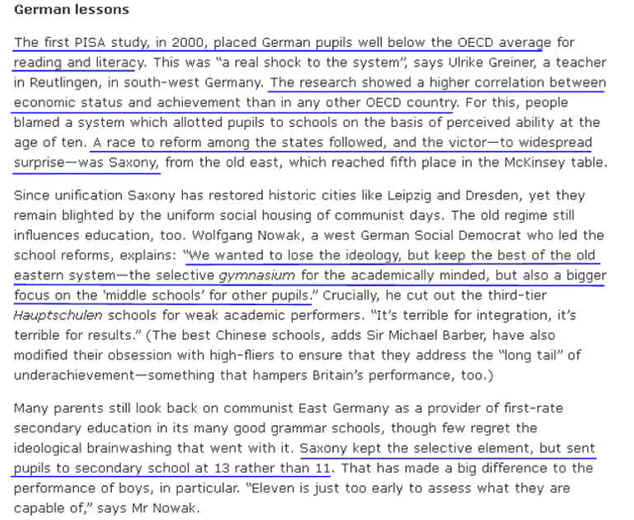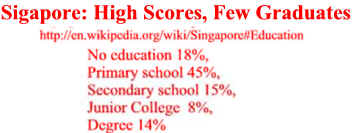|

Return to
Proposed Education Manifesto
Updated
12/18/20 Please Share!
Source
Educating the Class of 2034
e-mail
comments to
Walter Antoniotti |
|
Individualized Curriculum
Primary Education
Secondary
Education |
Our German Competition
Grows the World's Most Successful Workers Making
High Value
Added Exports.
|
|
I. Individualized
Curriculum
Primary Education
based on a Student's Special
Intelligence.
1)
Special Intelligence
is above average ability a person has in one or more areas of the
multiple intelligences which include Mathematical, Spatial,
Bodily Movement, Musical, Verbal, Interpersonal,
and Intrapersonal. Curriculum should aim to maximize special intelligence.
Development of special intelligence provides the confidence necessary to
succeed in many of life's challenges.
2)
Core Intelligence
centers on
mathematical-logical and verbal intelligence.
Skills related to core intelligence are emphasized by traditional
curriculums.
3) Rewards await
people who develop skills associated with their special intelligence
provided they have
the minimum core intelligence skills required for their career. In the
words of John Dewey..."to prepare
him for the future life means to give him command of himself; it means
so to train him that he will have
the full and ready use of all his capacities"
My pedagogic creed, Dewey, 1897 Wiki
See
Born to Build
Secondary Education
A four twelve-week
terms with 4 plus 2 hour days for Secondary Education will improve
learning and decrease cost.
The
U.S. has the best universities in the world and
students only have 15-20 fifty-minute class periods per week. Our most
successful students also have structured unstructured time for labs to
apply knowledge or get involved with skill improving extracurricular
activities. Germany schools produce the world's most productive workers
and more than half her students finishes at 1 PM.
A 4 plus 2 day has four 50-minutes traditionally structured classes in a
row and two hours of structured unstructured time when a student's
Individualize Curriculum
is determined.
Students can work, take more academic classes, volunteer, create a
group to compete for academic prizes, attend career-focused academies,
play sports or let American ingenuity provide relevant learning
experiences.
Benefits
1)
Studies show students forget more than 10%
of their learning during the summer and
"lower-class students" lose most. See
Summer Setback: Race, Poverty ...Achievement in the First 2 Years
2) A two-tier classroom system has enhanced student work benefits.
3) Financial benefits for teachers result
as they can teach overload courses in their off session.
If a system's average teacher earns $50,000/year for sixteen courses or
$3,125 per class for a year round morning assignment they could earn say
$2000 per course for additional afternoon overload courses. Sixteen
overloads cost $32,000 saving $18,000 or 36% of a salary plus fringe
benefits and also make for happy teachers.
4) Economic facilities use would solve housing problems.
The potential cost saving for large school systems making maximum use of
their facilities are unlimited.
5) Structured Unstructured Time benefits the community.
It is spent at school or community facilities to enhance Special
Intelligence and also to provide paid/voluntary experiences for
students and teachers. John Dewey "...advocated for an educational
structure that strikes a balance between delivering knowledge while also
taking into account the interests and experiences of the student."
Academics will not suffer as trying to
enhance intelligence with additional memory training is not money well
spent.
source
6. Students discover and enhance their "Special
Intelligence." with "
Individualized
Curriculum"
1) Grades one to eight should concentrate on determine and
exploring a student's special intelligence while bringing their core
intelligence up to an acceptable minimum. Note:
This should be a fun time and not the rigor of some Asian countries and
tiger mothers of the United States.
Such activities caused anxious unhappy
students! If you must test, comparison to those in the student's school
and state would limit the negative effects on self-esteem.
See
No Grades/Homework
2) Career availability information should help students with their curriculum
choices.
Bureau of Labor Statistics
Job Opening Projections

|
II.
German Competition
Prelude 1: Changing
Education Paradigms
from
Royal Society for Encouragement of Arts,
Manufacturing , Commerce is
a 12 minute video depicting how our education system went astray. It
has led some to believe that Germany has redirected her
education system
in an appropriate direction.
Prelude 2:
Current Leaders Advise
from
Larry
Summers, Ralph Waldo Emerson, FDR, Winston Churchill...l are just of the few of the great leaders who have
advised us concerning our educational system.
The
Great School Revolution
explores how Germany helped weak testing students.
Economist
Magazine 9/17/11

German compulsory schooling begins at age six
and may continues through age eighteen. Children between the ages of three and
six may attend a Kindergarten
(day-care center, nursery school). Enrollment is optional. Kindergarten
[pl.] are operated by municipalities, churches and charitable organizations and
are not part of the state's compulsory school system.
In the first four grades of elementary school
(Grundschule)
all children are taught together. The curriculum stresses
language skills and mathematics. During the fourth year of elementary
school children and their parents usually decide on the type of
secondary school which begins with grade 5: Hauptschule-open
enrollment, Berufskolleg-
apprentice, Realschule
and Gymnasium
require good grades. The choice is determined by a student's
aptitudes, career aspirations and grades. In order to facilitate the
choice, most states offer a two-year transition period or orientation
phase or Orientierungsstufe
for grades 5 and 6. The choice of secondary school is not necessarily
final. In recent years the educational system has become more
"permeable", i.e. it has become easier to transfer from one
type of institution to another, thus making it possible to revoke
earlier decisions. source The
Educational System in Germany an excellent, concise overview of our
chief competitor.
Misleading
International Test
Scores

Editor's Note: This old data should be updated.
antonw@ix.netcom.com
Other Education Studies
Education Internet Library
Educational Video Supplements
Education Improvement Internet Library
Education Improvement Ideas
Education Analysis
Education Manifesto
from Around the World.
Historical Observations
from Confucius-FDR-Summers
Advise from 20th Century Leaders
Churchill-Murray-Greenspan
Education-Ten Commandments
Educating the Class of 2039
Starting Date 9/1/21
Self Education Sites
20th Century Education
Education Statistics |
|
Teach Students to Read and Do a Little Basic Math and
Get Out of the Way
"http://www.textbooksfree.org/Individualized%20Curriculum.htm#Teach%20Students%20to%20read
"Computerized work has also made
knowledge more abstract and more reliant on data. In the late 1970s,
Ford Motor Company began to use computer-controlled fuel injection
systems in place of mechanical carburetors. Ford soon experienced heavy
warranty expenditures because many technicians, not understanding fuel
injection, would tackle a problem by "throwing parts at
it"—replacing one component after another in the hope that
something would work. Ford responded by requiring that warranty repairs
could only be made by technicians who had passed a training course on
repairing fuel injection systems. Half of the technicians who took the
training course failed, many because they could not read well enough
to understand the technical manuals. They knew how to repair
mechanical carburetors because they had watched other mechanics do it.
Watching other mechanics could not teach them to use computerized tools
to test electronic components."
By making students read what the
system wants and not what the student wants means too many students
never really learn to read. Learning to read is key and what they read is
secondary. The idea that you taking CIVICS or studying US History makes
someone a good criticize seems unrealistic. Taking General Science for
students who don't like science was like me taking Gym. It was a waste
of time. Let students study what they want to study and manage their
studies. Can you imagine all the money we spent educating these
mechanics and they couldn't read. Algebra was not the problem.
The term length of a senator versus a house member wasn't the problem. They
couldn't read! |
|
Dancing
with Robots Frank Levy and Richard J. Murnane,
They are correct in one respect
and incorrect in another.
"It is important to
put these trends in perspective. American schools are not worse than
they were in a previous generation. Indeed, the evidence is to the
contrary. Results from the NAEP long-term assessments show that most
American students now master foundational skills as defined 40 years
ago—for example, reading well enough to follow directions. Today’s
education problem stems from the increased complexity of foundational
skills needed in today’s economy and from the changes in family income
and family structure that leave a significant portion of American
children unprepared to learn when they enter school."
He is correct. There has been an
increase in the complexity of foundational skills needed in today’s
economy.
He is wrong that
the changes in family income and family structure
leave a significant portion of American children unprepared to learn
when they enter school. Why? Because intelligence is normally distributed and
it is impossible to increase large numbers of people capable of mastering these more difficult foundational skills. Just find the
selected few
intelligent people and encourage them to develop foundation skills and
reward them economically.
|
Stay Current
John
William Pope Center for Higher Education Policy
covers post-secondary issues.
The
Rising Value of a Science Degree
College
Degree Value:
P-Tech
Early College High Schools are vocationally oriented.
| |
David Hummels, Rasmus
Jorgensen,
Jakob R. Munch and Chong Xiang
examine data from Denmark to look at the connection between
globalization, inequality and the value of a college degree. “With
stagnating wages and lingering unemployment, income inequality is
back in the headlines. Is globalization to blame for this
inequality? Is more education a solution? This column argues that
focusing on university education misses important effects. It
presents evidence that wage effects vary markedly among those with
degrees depending on their specific skill sets, and that
globalization can often benefit workers without degrees.” |
|
| |
|
|
From
Pew Institute: Millennials will benefit and
suffer due to their hyper connected lives
seems directed toward the top thinkers.
Head
Start leads to nonacademic value
If we listened to the Very Serious People, we'd be trying hard to train
people to work in tech,
rather than in burgeoning heavy industry, that are having major booms. Read
Article »
Videos
Formula
for changing math education
Ken Robinson Says Schools Kill
Creativity
Elizabeth Gilbert On Genius
The 5 Minute University
Visit Our Other
Learning Libraries
http://www.textbooksfree.org/Free%20Internet%20Libraries.htm#Education__1
Old Version
1)
Primary Education should not be so rigorous that a substantial number of students dislike
school.
The first 6-8 grades should be
changed to concentrate on a student does best, their special
intelligence. Gardner's
multiple intelligences which include Mathematical, Spatial,
Bodily Movement, Musical, Verbal, Interpersonal and Intrapersonal is a
reasonable model.
. Curriculum should maximize special intelligence.
2)
Core Intelligence centers on
mathematical-logical intelligence and verbal intelligence.
Skills related to core intelligence are emphasized by traditional
curriculums.
3) We must adjust curricula to acknowledge that technology helps those
with high mathematical-logical and verbal-linguistic (problem
solving, fix or repair, programming) intelligence more than those
with Spatial (dance, sports, driving a bus), bodily-kinesthetic (acting,
mime, sports), musical-rhythmic (composing, playing music, clapping,
reading, using words, public speaking, storytelling, interpersonal
(social skills, reading other people, working in a group),
7. interpersonal (introspection, self-assessment, goal making, vision,
planning),
8. Naturalist (able to distinguish among, classify, and use
environmental features)
intelligence.
4) Because 66% of the high
school graduates taking jobs that
require no
additional formal education curriculums must
be made more life skills applicable. For example, studies show that
those people with self-control do better in many aspects of life and
this is something that can be taught. See
BLS
Projections
5) Technology and International Trade are
destroying good middle income jobs. In addition,
see
The Sagging of the Middle Class.
6) With only 4% of the jobs requiring an advanced degree,
a bachelor's degree should be solely directed toward entry level
careers, not graduate school.
That is, a nursing student should not have to take statistics (a course I
taught for 35 years) because
they might some day go on for a master's degree. So for every 100
nursing students who take statistics, 10 might need it later and by then will have forgot what little they
learned or choose a non-quantitative thesis.
7)
Because the
economic
Laws of
Diminishing Returns and
Diminishing Utility apply to the learning
experiences, the
school year should be expanded to four twelve-week terms. Schools
would have four
hour sessions a few times a day. Teaches would
be required to teach four terms per year. Teaching additional courses
for extra pay or to accumulate leave time would be encouraged Leave time would be an earned privilege. For example a
teacher earning $64,000/year for a morning shift or $4000 per
course might teach an overload afternoon course for $2000. Four
teachers doing this would save half a salary for society.
Ambitious
students could take courses in the second session or use the time to
participate in projects like First
Robotics Competition, First
Tech Challenge, and First
Lego League. P-Tech
uses the extra time to help students earn an associates degree while
earning a H.S. diploma.
This system would be
advantageous for vocational HS as it provides time for students to work.
Two talented students might even combine for a full time job.
.
A lower minimum wage for part time students not
requiring payroll taxes would help.
Sports would benefit as
students might attend morning classes and practice in the afternoon and a
second sport would do the opposite thus making much better use of
facilities.
School systems could retire
older facilities and free rooms could be rented to people wanting to run
morning and afternoon day care for working parents.
Teachers and HS students could work in day care programs for a
reasonable fee. Students wishing to graduate early could take
extra courses during a different session for a fee.
8) Students would take four
courses designed so students can progress at their
own pace. 1) Communicating, 2) Math/science 3) Social Science 4)
Whatever they want excluding courses 1-3.
9)
Tech-based Education would apply to college education
immediately but hopefully soon spread to secondary education.
10)
The Quick Notes Philosophy
was the bases for much of this dissertation.
11) Quick
Thoughts
A. Treat academic all stars like sports stars.
B. Do whatever it takes to enhance the economic and
personal
skills of those in the middle.
C. Enhance the lives of the less
fortunate.
D. Follow the lead of Baltimore and others to
keep kids
in school.
edited by Walter
Antoniotti copyright 21st
Century Learning Products All Rights Reserved



